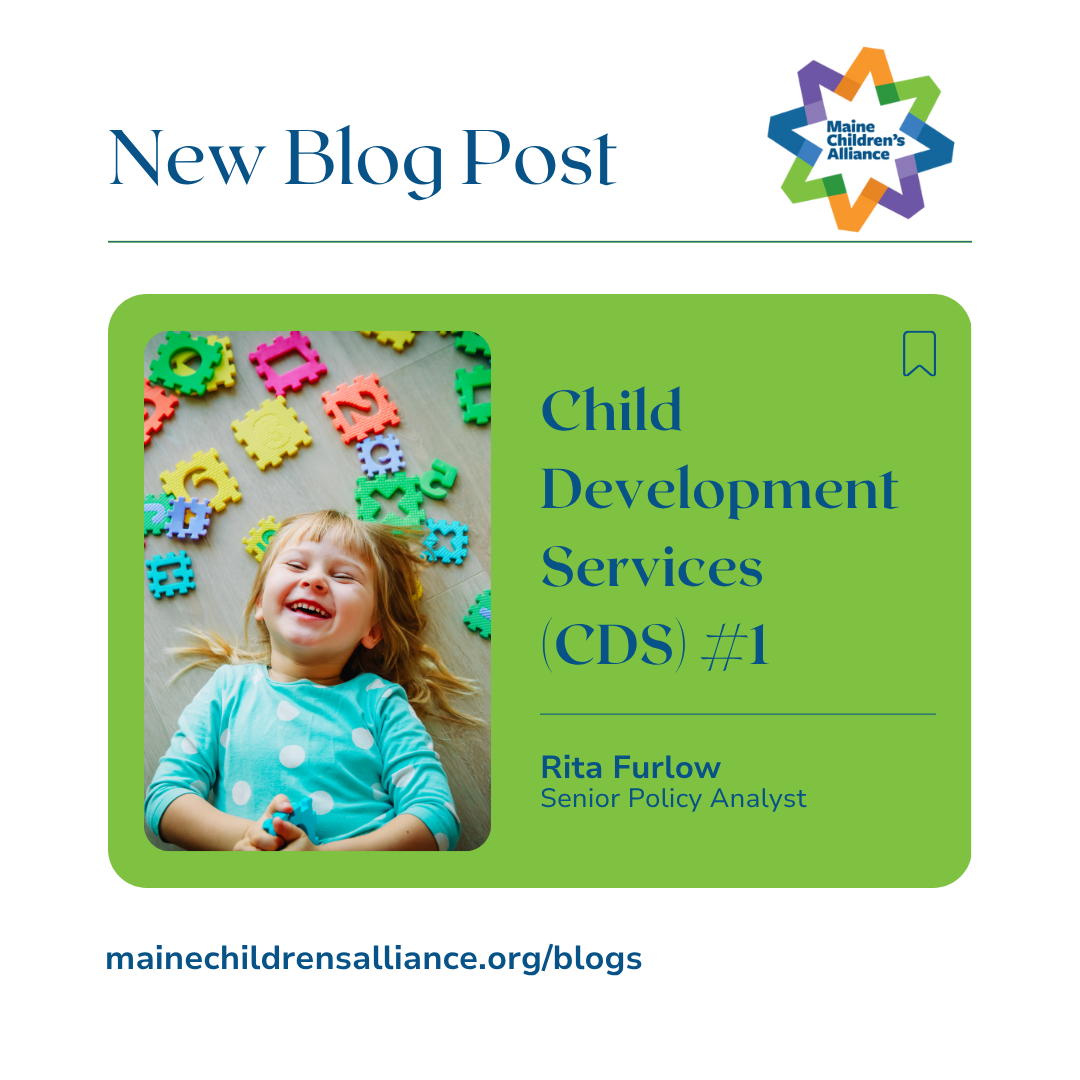Child Development Services (CDS) Blog #1
Oct 06 2025 14:32
CDS Blog #1

By Rita Furlow, JD (Senior Policy Analyst) & Clare McNerney (Policy & Communications Associate)
MCA is excited to feature a series of educational blog posts about Maine’s system of providing supports for our youngest children with disabilities or developmental delays. We’ll dive in deep to Child Development Services, early intervention, and the transition of preschool services to public schools. We will explore the relationships of these services with Medicaid and the benefit called Early and Periodic Screening, Diagnostic, and Treatment (EPSDT), the “child find” obligation, the lack of providers across our state, and recommendations for change. Stay tuned for more!
Maine’s future depends in large part on our ability to support the children who will lead tomorrow’s communities. We know from brain research the critical importance of the first five years of brain development, when the brain has the most plasticity -- or capacity for change. For some young children, their development progresses along a slower timetable or in an atypical manner. For those infants and toddlers with a disability or developmental delay, intervening early can make all the difference in the world to their future outcomes. Congress determined that intervention services for our youngest children should:
- Enhance the development of infants and toddlers with disabilities;
- Reduce later educational costs by minimizing the need for special education
- Strengthen the capacity of families to meet their child’s needs
- Minimize the likelihood of lifelong supports and maximize independent living.
The Individuals with Disabilities Education Act (IDEA) is the federal law that governs how states and school districts provide early intervention services and special education and related services for children with disabilities from birth to under age 22 [1]. As of this year, over 20% of Maine kids are receiving special education services.
- IDEA authorizes federal grants to states, and through them, local school districts, to provide a “free appropriate public education” (FAPE) to eligible children with disabilities. The law provides partial funding and sets conditions for that funding to ensure the civil rights of students.
-
There are four parts to the IDEA statute[2].
- Part A - includes the general provisions, purpose, and definitions
-
Part B
- programs that cover children from ages three to under 22
- Within Part B, Section 619 of the statute includes provisions specific to serving preschool children ages three through five
- Part C - covers grants to support early intervention services for infants and toddlers, ages birth to age three
- Part D- governs discretionary grants to support state personnel development, technology, parent training and information centers (such as Maine Parent Federation), and technical assistance
The process of locating, identifying, and evaluating children with disabilities and delays to ensure they receive services under the law is referred to as “child find.” Under IDEA, the state entity or school district responsible for “child find” has an affirmative duty to identify and screen children who may need early intervention [3] and/or special education and related services. [4] Children who are suspected of having a disability or developmental delay should be referred for an evaluation to determine if they are eligible for early intervention/special education services.
History of CDS in Maine
In 1978, the Maine Legislature established three pilot sites, which eventually expanded to 16 regional sites, providing “special needs preschool services” to young children. The Legislature established the Child Development Services System in 1989 by consolidating the 16 regional sites with a state-level office.
Following numerous changes in structure, the Maine Legislature approved legislation in 2024 that shifted the responsibility of providing a free appropriate public education from CDS to School Administrative Units (SAU), or public schools, by July 1, 2028. Services for infants and toddlers under Part C were also rebranded as Early Intervention for ME.
The next few parts of this blog series will break down what these changes mean for Maine families and how we can improve services for our youngest children. Stay tuned!
References
[1] 20 U.S.C. § 1400 et seq. (2020).
[2] The U.S. Department of Education provides a user-friendly version of the IDEA statute and regulations on its website. https://sites.ed.gov/idea/statuteregulations/
[3] 20 U.S.C. § 1435(a)(5)(2020).
[4] 20 U.S.C § 1412(a)(3)(2020).
Upcoming Events
Stay informed about key industry events and engagements. Here, you'll find details on upcoming conferences, meetings, and speaking engagements featuring our experts.
